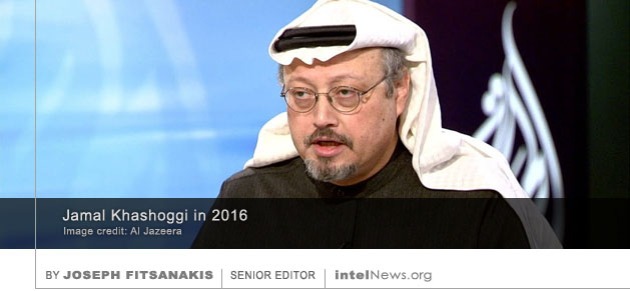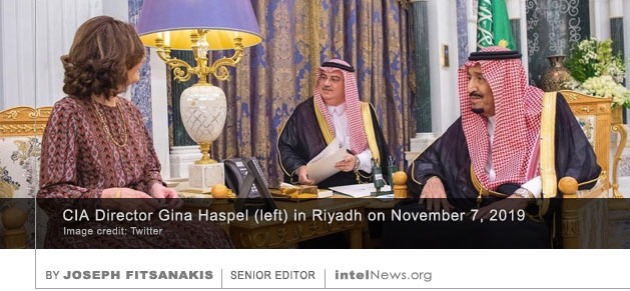Updated: France arrests, then releases, alleged assassin of Jamal Khashoggi
December 8, 2021 1 Comment
 AN ALLEGED MEMBER OF the assassin squad that killed and dismembered Saudi journalist Jamal Khashoggi in Turkey in 2018, is reportedly under arrest in France, where he was caught trying to board an international flight. Khashoggi, 59, was a Saudi government adviser who became critical of the Kingdom’s style of governance. He moved to the United States and began criticizing Saudi Arabia from the pages of The Washington Post. He was killed on October 2, 2018, by a 15-member Saudi hit squad while visiting the Saudi consulate in Istanbul, Turkey. He had gone there to be issued a certificate of divorce from his former wife in Saudi Arabia.
AN ALLEGED MEMBER OF the assassin squad that killed and dismembered Saudi journalist Jamal Khashoggi in Turkey in 2018, is reportedly under arrest in France, where he was caught trying to board an international flight. Khashoggi, 59, was a Saudi government adviser who became critical of the Kingdom’s style of governance. He moved to the United States and began criticizing Saudi Arabia from the pages of The Washington Post. He was killed on October 2, 2018, by a 15-member Saudi hit squad while visiting the Saudi consulate in Istanbul, Turkey. He had gone there to be issued a certificate of divorce from his former wife in Saudi Arabia.
After several weeks of vehemently denying any role in Khashoggi’s killing, the Saudi government eventually admitted that the journalist was killed inside the Saudi consulate in Istanbul. One of Khashoggi’s alleged killers is Khaled Aedh Alotaibi (or al-Otaibi), a 33-year-old member of the Saudi Royal Guard Regiment, whose mission is to protect the Saudi royal family. Alotaibi has been barred from entering several Western countries, including the United States and the United Kingdom. But Saudi Arabia has rejected a request by Turkey to extradite him to face charges in a Turkish court. The oil kingdom argues that Alotaibi was not among a group of “rogue” intelligence officers” who killed Khashoggi, and have since been punished under Saudi law.
Yesterday several French media outlets reported that Alotaibi had been arrested at the Paris Charles de Gaulle Airport at 9:30 am local time, as he was about to board a commercial flight to the Saudi capital Riyadh. He was apparently traveling under his real passport and not under an assumed identity. He has since been placed under judicial detention, while French authorities are trying to confirm that he is the same person who is wanted for the killing of Khashoggi. If this is confirmed, Alotaibi will be facing a preliminary hearing this week, and a French court will have to decide whether he will be extradited to Turkey.
In a statement published late on Tuesday, the Saudi embassy in France dismissed Alotaibi’s arrest as “a case of mistaken identity” and repeated the official Saudi government stance that all those who participated in Khashoggi’s murder have already faced justice in Saudi Arabia. It is worth noting that Alotaibi’s arrest occurred just days after French President Emmanuel Macron became the first major Western leader to openly meet with Saudi Arabia’s Crown Prince Mohamed Mohammad Bin Salman. The de-facto ruler of the country is believed by many to have ordered Khashoggi’s assassination.
Update: Early on Wednesday, French prosecutors said that the warrant issued by Turkey for the arrest of Alotaibi did not apply to the individual arrested on Tuesday. In a statement released to the press, the prosecutor’s office said: “Extensive checks on the identity of this person showed that the warrant did not apply to him. [Therefore] he was released”.
► Author: Joseph Fitsanakis | Date: 08 December 2021 | Permalink


 BELGIUM’S LARGEST MOSQUE has been infiltrated by Moroccan intelligence, according to the Belgian minister of justice, who allegedly consulted the country’s spy services in making that determination. The announcement has further-strained relations between the Belgian government and the country’s Muslims, which account for about 5% of the Belgian population.
BELGIUM’S LARGEST MOSQUE has been infiltrated by Moroccan intelligence, according to the Belgian minister of justice, who allegedly consulted the country’s spy services in making that determination. The announcement has further-strained relations between the Belgian government and the country’s Muslims, which account for about 5% of the Belgian population. Canadian border guards thwarted a sophisticated plot to kill a Saudi former senior intelligence official, who has been targeted by the oil kingdom’s crown prince because he served a rival member of the royal family, according to a lawsuit filed in an American court.
Canadian border guards thwarted a sophisticated plot to kill a Saudi former senior intelligence official, who has been targeted by the oil kingdom’s crown prince because he served a rival member of the royal family, according to a lawsuit filed in an American court. Two days after dropping charges against three Saudi men for spying on American soil, United States prosecutors submitted a new indictment that restates the two original charges and adds five more. The original complaint was filed by the Federal Bureau of Investigation in November of last year in San Francisco, California. It accused three men of “acting as unregistered agents” of Saudi Arabia since 2015. The phrase is used in legal settings to refer to espionage.
Two days after dropping charges against three Saudi men for spying on American soil, United States prosecutors submitted a new indictment that restates the two original charges and adds five more. The original complaint was filed by the Federal Bureau of Investigation in November of last year in San Francisco, California. It accused three men of “acting as unregistered agents” of Saudi Arabia since 2015. The phrase is used in legal settings to refer to espionage. In a surprising move, the United States government is seeking to dismiss espionage charges it filed last year against three men, including a member of staff of Saudi Arabia’s royal family, who were caught spying on American soil. Last November, the Federal Bureau of Investigation
In a surprising move, the United States government is seeking to dismiss espionage charges it filed last year against three men, including a member of staff of Saudi Arabia’s royal family, who were caught spying on American soil. Last November, the Federal Bureau of Investigation  A Saudi government official, who served as a senior advisor to the oil kingdom’s former Crown Prince, has accused the Saudi monarchy of abducting his children in order to force him to end his self-exile in Canada. With a doctorate in artificial intelligence from the University of Edinburgh, Dr. Saad al-Jabri was until 2015 a rare example of a highly educated government administrator among Saudi Arabia’s ruling elite. Dr. al-Jabri rose in the ranks of the Saudi aristocracy in the 1990s under the tutelage of his patron, Crown Prince Muhammad bin Nayef (pictured). Prince bin Nayef is the grandson of Saudi Arabia’s founding monarch, King Abdulaziz, and until 2015 was destined to succeed King Abdullah and occupy the kingdom’s throne. Eventually, bin Nayef appointed Dr. al-Jabri as Minister of State and made him his most senior and trusted adviser on matters of security and intelligence.
A Saudi government official, who served as a senior advisor to the oil kingdom’s former Crown Prince, has accused the Saudi monarchy of abducting his children in order to force him to end his self-exile in Canada. With a doctorate in artificial intelligence from the University of Edinburgh, Dr. Saad al-Jabri was until 2015 a rare example of a highly educated government administrator among Saudi Arabia’s ruling elite. Dr. al-Jabri rose in the ranks of the Saudi aristocracy in the 1990s under the tutelage of his patron, Crown Prince Muhammad bin Nayef (pictured). Prince bin Nayef is the grandson of Saudi Arabia’s founding monarch, King Abdulaziz, and until 2015 was destined to succeed King Abdullah and occupy the kingdom’s throne. Eventually, bin Nayef appointed Dr. al-Jabri as Minister of State and made him his most senior and trusted adviser on matters of security and intelligence. The government of Saudi Arabia may be exploiting a decades-old tracking system embedded in the global mobile telecommu- nications network in order to spy on its citizens as they travel abroad, a report suggests. The report was
The government of Saudi Arabia may be exploiting a decades-old tracking system embedded in the global mobile telecommu- nications network in order to spy on its citizens as they travel abroad, a report suggests. The report was  A senior Bahraini cabinet minister on Thursday accused the Iranian government of ‘biological aggression’ for spreading COVID-19 to several other countries in the Gulf, a claim that Iran promptly rejected. The allegation refers to Iran’s customary practice of not stamping the passport of visitors from some Sunni-majority nations.
A senior Bahraini cabinet minister on Thursday accused the Iranian government of ‘biological aggression’ for spreading COVID-19 to several other countries in the Gulf, a claim that Iran promptly rejected. The allegation refers to Iran’s customary practice of not stamping the passport of visitors from some Sunni-majority nations. Authorities in Denmark have announced the arrests of three Iranian Arab separatists, who are charged with carrying out espionage on behalf of the intelligence services of Saudi Arabia. The arrests were announced on Monday by the Danish Security and Intelligence Service, known as PET.
Authorities in Denmark have announced the arrests of three Iranian Arab separatists, who are charged with carrying out espionage on behalf of the intelligence services of Saudi Arabia. The arrests were announced on Monday by the Danish Security and Intelligence Service, known as PET. A day after the United States Department of Justice charged two Saudi citizens with engaging in espionage on American soil, Saudi officials hosted the director of the Central Intelligence Agency in Riyadh, reportedly to discuss “the longstanding Saudi-US partnership”.
A day after the United States Department of Justice charged two Saudi citizens with engaging in espionage on American soil, Saudi officials hosted the director of the Central Intelligence Agency in Riyadh, reportedly to discuss “the longstanding Saudi-US partnership”. Saudi Arabia and the United States suffered “a total and embarrassing [intelligence] failure” in the lead-up to the drone strikes that shut down half of the kingdom’s oil production last month, according to Israeli sources. In the early hours of September 14, missiles
Saudi Arabia and the United States suffered “a total and embarrassing [intelligence] failure” in the lead-up to the drone strikes that shut down half of the kingdom’s oil production last month, according to Israeli sources. In the early hours of September 14, missiles 





